Poems of Anne Brontë, 1842–45
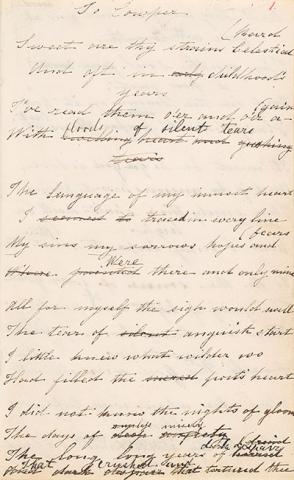
This 22-page manuscript includes the texts of eight poems that Anne Brontë composed in 1842 and 1843, when she was twenty-two and twenty-three, and another from early 1845. The manuscript is a fair copy—a neat transcription that Brontë made of earlier drafts that do not survive. After she had recopied her drafts onto these sheets, Brontë continued to revise some of the texts, most quite lightly, but one (“To Cowper”) substantively.
Seven of the nine compositions were included in Poems by Currer, Ellis, and Acton Bell (London: Aylott & Jones), the book that Anne and her sisters Charlotte and Emily published pseudonymously in 1846. For publication, several of the titles were changed (“A Hymn,” for example, became “A Doubter’s Prayer”), the punctuation was regularized, and the texts were slightly revised. Two of the poems (“To ——” and “Night”) remained unpublished within Brontë’s lifetime.
Today, the manuscript comprises eleven unbound sheets, each 18 x 11 cm (about 7 x 4 1/3 inches). Over the years, the manuscript has undergone a number of changes in physical format. When she created the manuscript in the 1840s, Brontë almost certainly wrote into a simple bound notebook. Likely in the 1890s, several decades after Brontë’s death, the notebook was taken apart and the individual sheets trimmed very close to Brontë’s handwriting. A “stub” (a thin strip of paper) was adhered to the left edge of each sheet, and the manuscript was then rebound with boards covered in leather. According to conventions of the time, this type of binding made the manuscript both more durable and more attractive to autograph collectors.
J. Pierpont Morgan purchased the manuscript for $250 from the London dealer J. Pearson & Co. in 1900. At some point after Morgan acquired the manuscript, Marguerite Duprez Lahey (1880–1958), a craft bookbinder who did work for Morgan and was later employed by the Pierpont Morgan Library, rebound the volume in paper-covered boards with a leather spine. By the late twentieth century, the binding she had created had significantly deteriorated, and paper conservators at the Morgan removed each sheet from old stubs to which they were glued. There was, of course, no way to return the manuscript to its original format, as there is no record of the appearance of Anne Brontë’s original copybook and its covers were discarded over a century ago.
Introduction, notes, and manuscript transcriptions by Christine Nelson, Drue Heinz Curator of Literary and Historical Manuscripts, 2019. We acknowledge with gratitude the work of scholars Edward Chitham and Christine Alexander.
Note on the text
A transcription of each page of Brontë’s manuscript text, including cancelled words, is provided. Her original spelling and capitalization are retained. An effort has been made to transcribe her punctuation marks, though many are ambiguous.
All but two of the poems in this manuscript appeared in Poems by Currer, Ellis, and Acton Bell (London: Aylott & Jones, 1846); the published texts are provided below the manuscript texts to allow for comparison. The texts of all the poems appear in Edward Chitham’s edition The Poems of Anne Brontë: A New Text and Commentary (London: Macmillan, 1979), poems 19–26 and 37.
Anne Brontë
1820–1849
To Cowper and other poems : autograph manuscript of 9 poems, signed, 1842–1845
Purchased by Pierpont Morgan, 1900, MA 28
Thumbnails
“To Cowper”, p. 1
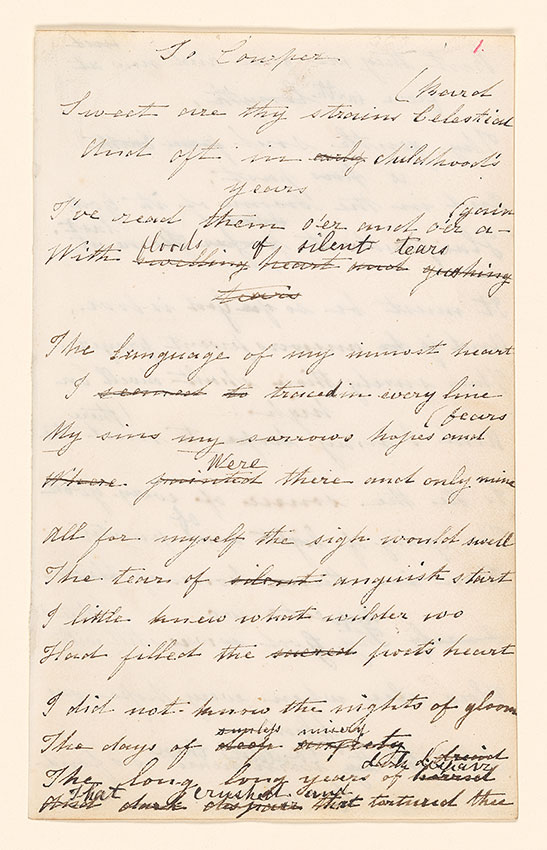
To Cowper and other poems : autograph manuscript of 9 poems, signed, 1842–1845
Purchased by Pierpont Morgan, 1900
“To Cowper” (pp. 1–3)
Dated 10 November 1842, when Brontë was twenty-two. The poem is addressed to the English poet William Cowper (1731–1800). First published in Poems (1846). Poem 19 in Chitham (1979).
To Cowper
Sweet are thy strains Celestial Bard
And oft in early childhood’s years
I’ve read them o’er and o’er again
With swelling heart and gushing tears floods of silent tears
The language of my inmost heart
I seemed to traced in every line
My sins my sorrows hopes and fears
Where painted [or printed] Were there and only mine
All for myself the sigh would swell
The tears of silent anguish start
I little knew what wilder wo
Had filled the [sacred] poet’s heart
I did not know the nights of gloom
The days of deep anxiety sunless misery;
The long long years of horrid dread dark despair
And dark despair that That crushed and tortured thee
Text as published in Poems (1846)
TO COWPER.
Sweet are thy strains, celestial Bard;
And oft, in childhood’s years,
I’ve read them o’er and o’er again,
With floods of silent tears.
The language of my inmost heart,
I traced in every line;
My sins, my sorrows, hopes, and fears,
Were there—and only mine.
All for myself the sigh would swell,
The tear of auguish start;
I little knew what wilder woe
Had filled the Poet’s heart.
I did not know the nights of gloom,
The days of misery;
The long, long years of dark despair,
That crushed and tortured thee.
| Attachment | Size |
|---|---|
| 15.07 MB |
“To Cowper”, p. 2

To Cowper and other poems : autograph manuscript of 9 poems, signed, 1842–1845
Purchased by Pierpont Morgan, 1900
“To Cowper” (pp. 1–3)
Dated 10 November 1842, when Brontë was twenty-two. The poem is addressed to the English poet William Cowper (1731–1800). First published in Poems (1846). Poem 19 in Chitham (1979).
But they are gone and now at last at length from earth,
Thy gentle soul from Earth is [has] past,
And in the bosome of its God
Has found its proper sheltering Home at last.
It must be so if for God is love,
And if he answers fervent prayer;
Then surely thou shalt dwell on high,
And I may hope to meet thee there
Is he the source of every good
The spring of light and of purity
Then in thine hours of blackest deepest wo
Surely Thy God so was still with thee?
How else when every hope was fled
Should thy warm heart Couldst thou so fondly cling
Text as published in Poems (1846)
But they are gone; from earth at length
Thy gentle soul is pass’d,
And in the bosom of its God
Has found its home at last.
It must be so, if God is love,
And answers fervent prayer;
Then surely thou shalt dwell on high,
And I may meet thee there.
Is he the source of every good,
The spring of purity?
Then in thine hours of deepest woe,
Thy God was still with thee.
How else, when every hope was fled,
Couldst thou so fondly cling
| Attachment | Size |
|---|---|
| 15.07 MB |
“To Cowper”, p. 3

To Cowper and other poems : autograph manuscript of 9 poems, signed, 1842–1845
Purchased by Pierpont Morgan, 1900
“To Cowper” (pp. 1–3)
Dated 10 November 1842, when Brontë was twenty-two. The poem is addressed to the English poet William Cowper (1731–1800). First published in Poems (1846). Poem 19 in Chitham (1979).
To holy things and holy men
And how couldst thou so sweetly sing—
Of things that God alone could teach?
And whence that Angel purity;
That hatred of all sinful ways
That kind and gentle charity?
Are these the symptoms of a heart
Of every Heavenly grace bereft
For ever bannished from its God
To Satan[’]s wildest fury left?
Yet, should thy blackest darkest fears be true
If Heaven’s decrees be so severe
That such a soul as thine is lost
O! how my God shall I appear?
Anne Brontë
Nov – 10th 1842
Text as published in Poems (1846)
To holy things and holy men?
And how so sweetly sing,
Of things that God alone could teach?
And whence that purity,
That hatred of all sinful ways—
That gentle charity?
Are these the symptoms of a heart
Of heavenly grace bereft:
For ever banished from its God,
To Satan’s fury left?
Yet, should thy darkest fears be true,
If Heaven be so severe,
That such a soul as thine is lost,—
Oh! How shall I appear?
| Attachment | Size |
|---|---|
| 15.07 MB |
“To ——, p. 4
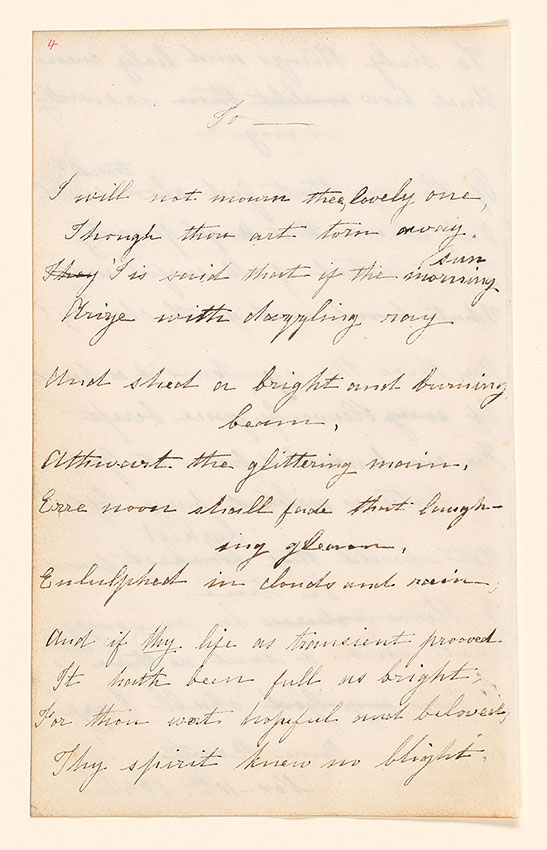
To Cowper and other poems : autograph manuscript of 9 poems, signed, 1842–1845
Purchased by Pierpont Morgan, 1900
“To ——” (pp. 4–6)
Dated December 1842, when Brontë was twenty-two. Not included in Poems (1846); first published in Ada May Harrison and Derek Stanford, Anne Brontë: Her Life and Work (London: Methuen & Co., 1959). Poem 20 in Chitham (1979).
To ———
I will not mourn thee, lovely one,
Though thou art torn away.
They ’Tis said that if the morning sun
Arize with dazzling ray
And shed a bright and burning beam,
Athwart the glittering main,
Erre noon shall fade that laughing gleam,
Engulphed in clouds and rain;
And if thy life as transient proved
It hath been full as bright,
For thou wert hopeful and beloved,
Thy spirit knew no blight.
| Attachment | Size |
|---|---|
| 15.07 MB |
“To ——, p. 5
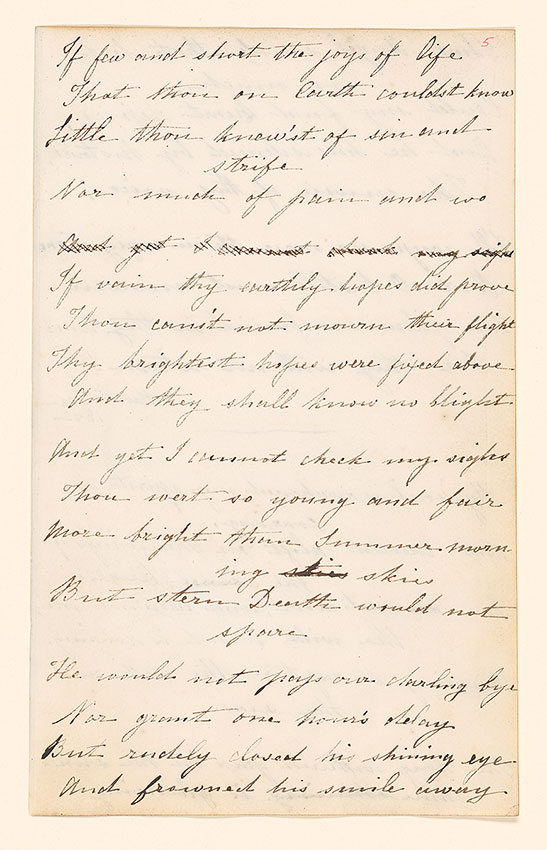
To Cowper and other poems : autograph manuscript of 9 poems, signed, 1842–1845
Purchased by Pierpont Morgan, 1900
“To ——” (pp. 4–6)
Dated December 1842, when Brontë was twenty-two. Not included in Poems (1846); first published in Ada May Harrison and Derek Stanford, Anne Brontë: Her Life and Work (London: Methuen & Co., 1959). Poem 20 in Chitham (1979).
If few and short the joys of life
That thou on Earth couldst know
Little thou knew’st of sin and strife
Nor much of pain and wo
And yet I cannot check my sighs
If vain thy earthly hopes did prove
Thou cans’t not mourn their flight
Thy brightest hopes were fixed above
And they shall know no blight.
And yet I cannot check my sighs
Thou wert so young and fair
More bright than summer morning skies skies
But stern Death would not spare
He would not pass our darling bye
Nor grant one hour’s delay
But rudely closed his shining eye
And frowned his smile away
| Attachment | Size |
|---|---|
| 15.07 MB |
[“My soul is awakened”] , p. 6
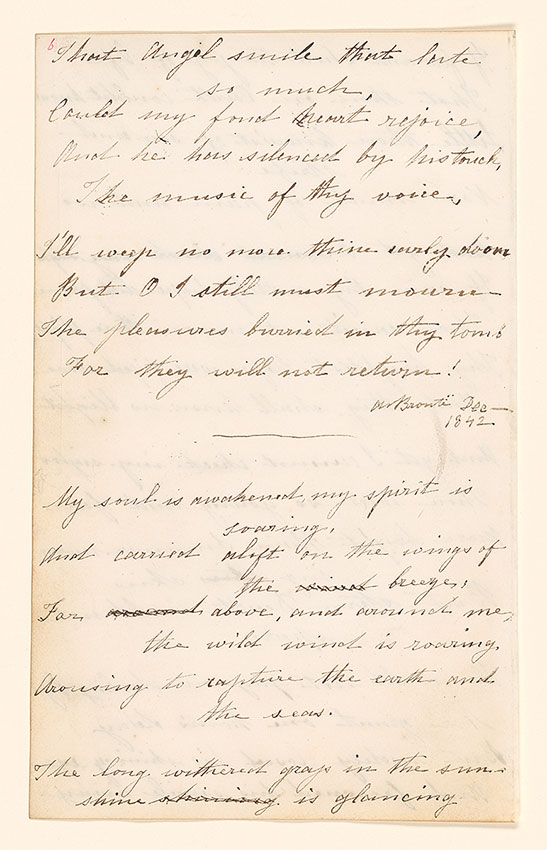
To Cowper and other poems : autograph manuscript of 9 poems, signed, 1842–1845
Purchased by Pierpont Morgan, 1900
“To ——” (pp. 4–6)
Dated December 1842, when Brontë was twenty-two. Not included in Poems (1846); first published in Ada May Harrison and Derek Stanford, Anne Brontë: Her Life and Work (London: Methuen & Co., 1959). Poem 20 in Chitham (1979).
[“My soul is awakened”] (pp. 6–7)
Dated 30 December 1842, when Brontë was twenty-two. First published in Poems (1846) with title “Lines Composed in a Wood on a Windy Day.” Poem 21 in Chitham (1979).
That Angel smile that late so much,
Could my fond heart rejoice;
And he has silenced by his touch,
The music of thy voice,
I’ll weep no more thine early doom
But O I still must mourn
The pleasures buried in thy tomb
For they will not return!
A Brontë Dec 1842
————————
My soul is awakened, my spirit is soaring,
And carried aloft on the wings of the wind breeze;
For around above, and around me, the wild wind is roaring,
Arousing to rapture the earth and the seas.
The long withered grass in the sunshine shining is glancing
Text as published in Poems (1846)
LINES COMPOSED IN A WOOD ON A WINDY DAY.
My soul is awakened, my spirit is soaring
And carried aloft on the wings of the breeze;
For above and around me the wild wind is roaring,
Arousing to rapture the earth and the seas.
The long withered grass in the sunshine is glancing,
| Attachment | Size |
|---|---|
| 15.07 MB |
[“My soul is awakened”] , p. 7

To Cowper and other poems : autograph manuscript of 9 poems, signed, 1842–1845
Purchased by Pierpont Morgan, 1900
[“My soul is awakened”] (pp. 6–7)
Dated 30 December 1842, when Brontë was twenty-two. First published in Poems (1846) with title “Lines Composed in a Wood on a Windy Day.” Poem 21 in Chitham (1979).
The bare trees are tossing their branches on high;
The dead leaves beneath them are merrily dancing,
The white clouds are scudding across the blue sky.
I wish I could see how the ocean is lashing,
The foam of its billows to wirl winds of spray,
I wish I could see how its proud waves are dashing
And hear the wild roar of their thunder today!
A Brontë December 30th 1842
Comp Composed in the Long-Plantation on a wild bright windy day.
Text as published in Poems (1846)
The bare trees are tossing their branches on high;
The dead leaves, beneath them, are merrily dancing,
The white clouds are scudding across the blue sky.
I wish I could see how the ocean is lashing
The foam of its billows to whirlwinds of spray;
I wish I could see how its proud waves are dashing,
And hear the wild roar of their thunder today!
| Attachment | Size |
|---|---|
| 15.07 MB |
“A Hymn”, p. 8
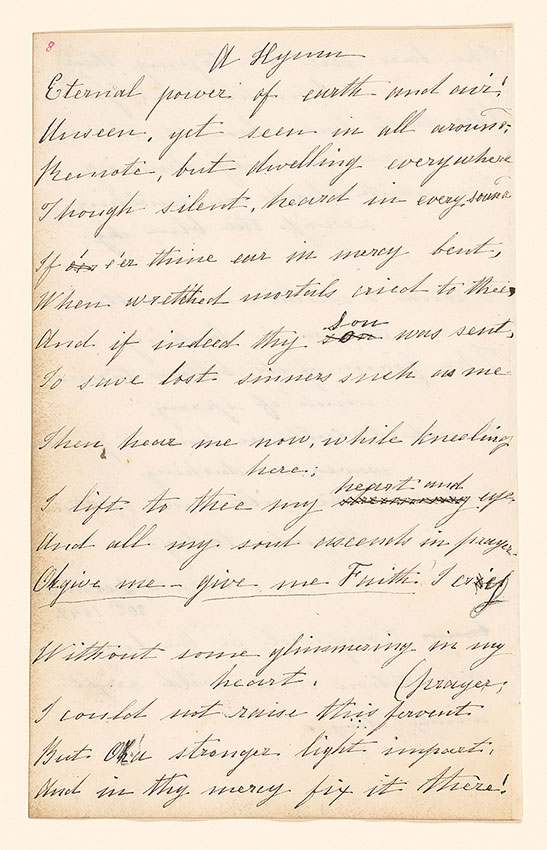
To Cowper and other poems : autograph manuscript of 9 poems, signed, 1842–1845
Purchased by Pierpont Morgan, 1900
“A Hymn” (pp. 8–11)
Dated 10 September 1843, when Brontë was twenty-three. First published in Poems (1846) with title “The Doubter’s Prayer.” Poem 23 in Chitham (1979).
A Hymn
Eternal power of earth and air!
Unseen, yet seen in all around;
Remote, but dwelling everywhere
Though silent, heard in every sound
If o’er e’er thine ear in mercy bent,
When wretched mortals cried to thee,
And if indeed thy sun Son was sent,
To save lost sinners such as me –
Then hear me now, while, kneeling here;
I lift to thee my streaming heart and eye,
And all my soul ascends in prayer
Oh give me – give me Faith! I cried cry.
Without some glimmering in my heart,
I could not raise this fervent prayer;
But, Oh! A stronger light impart;
And in thy mercy fix it there!
Text as published in Poems (1846)
THE DOUBTER’S PRAYER
Eternal Power, of earth and air!
Unseen, yet seen in all around,
Remote, but dwelling everywhere,
Though silent, heard in every sound.
If e’er thine ear in mercy bent,
When wretched mortals cried to Thee,
And if, indeed, Thy Son was sent,
To save lost sinners such as me:
Then hear me now, while, kneeling here,
I lift to thee my heart and eye,
And all my soul ascends in prayer,
Oh, give me—give me Faith! I cry.
Without some glimmering in my heart,
I could not raise this fervent prayer;
But, oh! A stronger light impart,
And in Thy mercy fix it there.
| Attachment | Size |
|---|---|
| 15.07 MB |
“A Hymn”, p. 9

To Cowper and other poems : autograph manuscript of 9 poems, signed, 1842–1845
Purchased by Pierpont Morgan, 1900
“A Hymn” (pp. 8–11)
Dated 10 September 1843, when Brontë was twenty-three. First published in Poems (1846) with title “The Doubter’s Prayer.” Poem 23 in Chitham (1979).
While Faith is with me, I am blest
It turns my darkest night to day
But while I clasp it to my breast
I often feel it slide away.
Then cold and dark my spirit sinks,
To see my light of life depart,
And every fiend of Hell methinks
Enjoys the anguish of my heart.
What shall I do if all my love,
My hopes, my toil, are cast away
And if there be no God above
To hear and bless me when I pray?
If this be vain delusion all,
If death be an eternal sleep,
And none can hear my secret call,
Or see the silent tears I weep,
Text as published in Poems (1846)
While Faith is with me, I am blest;
It turns my darkest night to day;
But while I clasp it to my breast,
I often feel it slide away.
Then, cold and dark, my spirit sinks,
To see my light of life depart;
And every fiend of Hell, methinks,
Enjoys the anguish of my heart.
What shall I do, if all my love,
My hopes, my toil, are cast away,
And if there be no God above,
To hear and bless me when I pray?
If this be vain delusion all,
If death be an eternal sleep,
And none can hear my secret call,
Or see the silent tears I weep!
| Attachment | Size |
|---|---|
| 15.07 MB |
“A Hymn”, p. 10
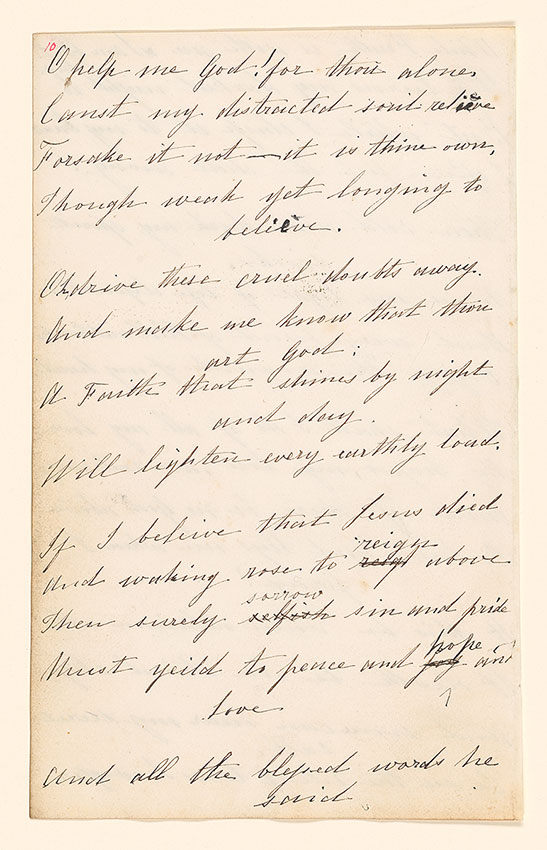
To Cowper and other poems : autograph manuscript of 9 poems, signed, 1842–1845
Purchased by Pierpont Morgan, 1900
“A Hymn” (pp. 8–11)
Dated 10 September 1843, when Brontë was twenty-three. First published in Poems (1846) with title “The Doubter’s Prayer.” Poem 23 in Chitham (1979).
O help me God! For thou alone,
Canst my distracted soul relieve
Forsake it not – it is thine own,
Though weak yet longing to believe.
Oh, drive these cruel doubts away,
And make me know that thou art God;
A Faith that shines by night and day,
Will lighten every earthly load.
If I believe that Jesus died
And waking rose to reigt reign above
Then surely selfish sorrow sin and pride
Must yield to peace and joy hope and Love.
And all the blessed words he said
Text as published in Poems (1846)
Oh, help me, God! For thou alone
Canst my distracted soul relieve;
Forsake it not: it is thine own,
Though weak, yet longing to believe.
Oh, drive these cruel doubts away;
And make me know, that Thou art God!
A faith, that shines by night and day,
Will lighten every earthly load.
If I believe that Jesus died,
And, waking, rose to reign above;
Then surely Sorrow, Sin, and Pride,
Must yield to Peace, and Hope, and Love.
And all the blessed words He said
| Attachment | Size |
|---|---|
| 15.07 MB |
“The Captive Dove”, p. 11
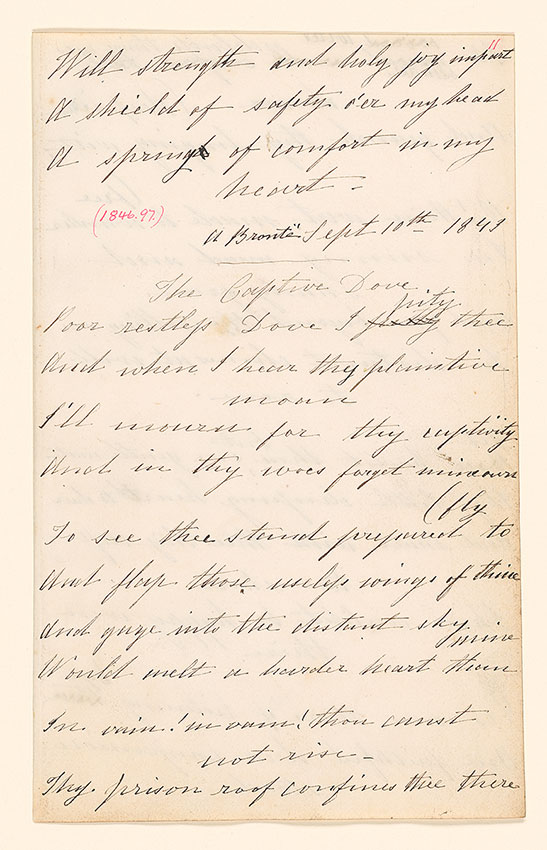
To Cowper and other poems : autograph manuscript of 9 poems, signed, 1842–1845
Purchased by Pierpont Morgan, 1900
“A Hymn” (pp. 8–11)
Dated 10 September 1843, when Brontë was twenty-three. First published in Poems (1846) with title “The Doubter’s Prayer.” Poem 23 in Chitham (1979).
“The Captive Dove” (pp. 11–13)
Dated 31 October 1843, but “Mostly written in the spring of 1842,” when Brontë was twenty-two. First published in Poems (1846). Poem 24 in Chitham (1979).
Will strength and holy joy impart
A shield of safety o’er my head
A spring of comfort in my heart –
A Brontë Sept 10th 1843
————————
The Captive Dove
Poor restless Dove I [pitty] pity thee
And when I hear thy plaintive moan
I’ll mourn for thy captivity,
And in thy woes forget mine own
To see thee stand prepared to fly
And flap those useless wings of thine
And gaze into the distant sky
Would melt a harder heart than mine
In vain! In vain! Thou canst not rise –
Thy prison roof confines thee there
Text as published in Poems (1846)
Will strength and holy joy impart:
A shield of safety o’er my head,
A spring of comfort in my heart.
THE CAPTIVE DOVE.
Poor restless dove, I pity thee;
And when I hear thy plaintive moan,
I mourn for thy captivity,
And in thy woes forget mine own.
To see thee stand prepared to fly,
And flap those useless wings of thine,
And gaze into the distant sky,
Would melt a harder heart than mine.
In vain—in vain! Thou canst not rise:
Thy prison roof confines thee there;
| Attachment | Size |
|---|---|
| 15.07 MB |
“The Captive Dove”, p. 12
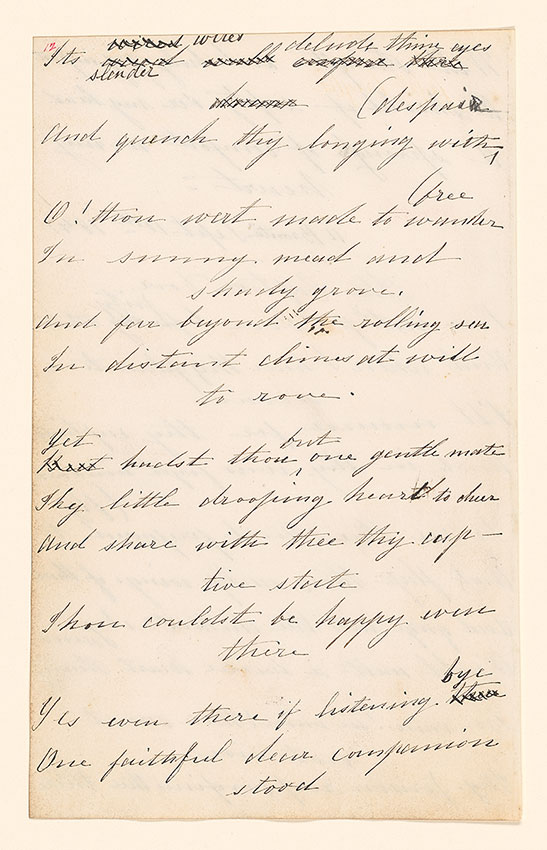
To Cowper and other poems : autograph manuscript of 9 poems, signed, 1842–1845
Purchased by Pierpont Morgan, 1900
“The Captive Dove” (pp. 11–13)
Dated 31 October 1843, but “Mostly written in the spring of 1842,” when Brontë was twenty-two. First published in Poems (1846). Poem 24 in Chitham (1979).
Its wired walls confine thee [?] slender wires delude thine eyes
And quench thy longings with despair.
O! thou wert made to wander free
In sunny mead and shady grove,
And far beyond the rolling sea
In distant climes at will to rove.
But Yet hadst thou but one gentle mate
Thy little drooping heart to cheer
And share with thee thy captive state
Thou couldst be happy even there.
Yes even there if listening [there or thou] bye
One faithful dear companion stood
Text as published in Poems (1846)
Its slender wires delude thine eyes,
And quench thy longings with despair.
Oh, thou wert made to wander free
In sunny mead and shady grove,
And, far beyond the rolling sea,
In distant climes, at will to rove!
Yet, hadst thou but one gentle mate
Thy little drooping heart to cheer,
And share with thee thy captive state,
Thou couldst be happy even there.
Yes, even there, if, listening by,
One faithful dear companion stood,
| Attachment | Size |
|---|---|
| 15.07 MB |
“The Consolation”, p. 13
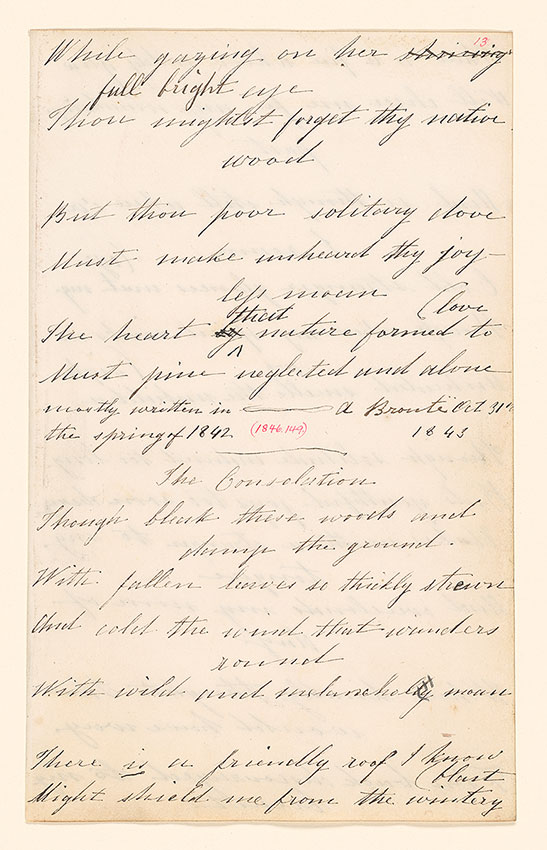
To Cowper and other poems : autograph manuscript of 9 poems, signed, 1842–1845
Purchased by Pierpont Morgan, 1900
“The Captive Dove” (pp. 11–13)
Dated 31 October 1843, but “Mostly written in the spring of 1842,” when Brontë was twenty-two. First published in Poems (1846). Poem 24 in Chitham (1979).
“The Consolation” (pp. 13–16)
Dated 7 November 1843, when Brontë was twenty-three. Written in the voice of Hespera Caverndel, a character in the Gondal saga. First published in Poems (1846). Published in Wuthering Heights and Agnes Grey (London: Smith Elder, 1850) with title “Lines Written from Home” and revisions by Charlotte Brontë. Poem 25 in Chitham (1979); also published in The Brontës: Tales of Glass Town, Angria, and Gondal. Selected Writings, ed. Christine Alexander (Oxford University Press, 2010), pp. 466–67.
While gazing on her shining full bright eye
Thou mightst forget thy native wood
But thou poor solitary dove
Must make unheard thy joyless moan
The heart by that nature formed to love
Must pine neglected and alone
Mostly written in the spring of 1842 ———
A Brontë Oct 31st 1843
————————
The Consolation
Though bleak these woods, and damp the ground
With fallen leaves so thickly strewn
And cold the wind that wanders round
With wild and melancholy moan
There is a friendly roof, I know
Might shield me from the wintery blast;
Text as published in Poems (1846)
While gazing on her full bright eye,
Thou mightst forget thy native wood.
But thou, poor solitary dove,
Must make, unheard, thy joyless moan;
The heart, that Nature formed to love,
Must pine, neglected, and alone.
THE CONSOLATION.
Though bleak these woods, and damp the ground
With fallen leaves so thickly strown,
And cold the wind that wanders round
With wild and melancholy moan;
There is a friendly roof, I know,
Might shield me from the wintry blast;
| Attachment | Size |
|---|---|
| 15.07 MB |
“The Consolation”, p. 14
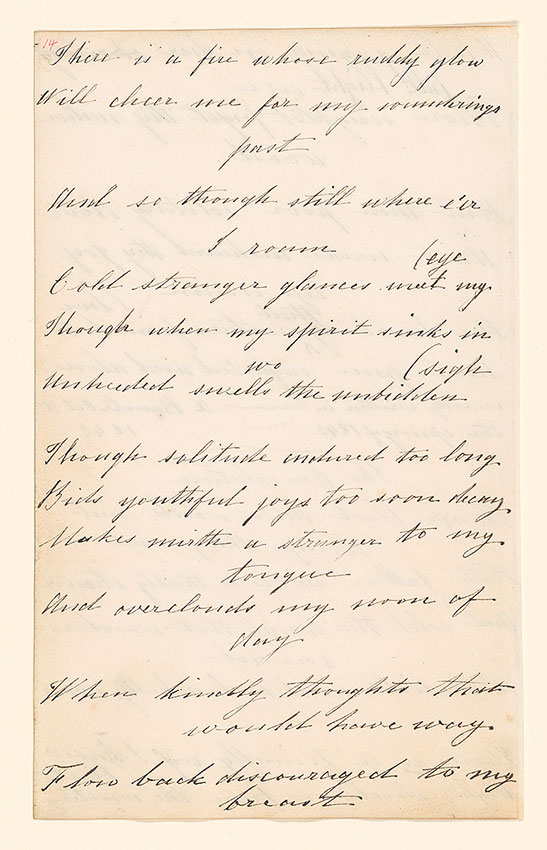
To Cowper and other poems : autograph manuscript of 9 poems, signed, 1842–1845
Purchased by Pierpont Morgan, 1900
“The Consolation” (pp. 13–16)
Dated 7 November 1843, when Brontë was twenty-three. Written in the voice of Hespera Caverndel, a character in the Gondal saga. First published in Poems (1846). Published in Wuthering Heights and Agnes Grey (London: Smith Elder, 1850) with title “Lines Written from Home” and revisions by Charlotte Brontë. Poem 25 in Chitham (1979); also published in The Brontës: Tales of Glass Town, Angria, and Gondal. Selected Writings, ed. Christine Alexander (Oxford University Press, 2010), pp. 466–67.
There is a fire whose ruddy glow
Will cheer me for my wanderings past
And so though still where’er I roam
Cold stranger glances meet my eye
Though when my spirit sinks in wo
Unheeded swells the unbidden sigh
Though solitude endured too long
Bids youthful joys too soon decay
Makes mirth a stranger to my tongue
And overclouds my noon of day
When kindly thoughts that would have way
Flow back discouraged to my breast
Text as published in Poems (1846)
There is a fire, whose ruddy glow
Will cheer me for my wanderings past.
And so, though still, where’er I go,
Cold stranger-glances meet my eye;
Though, when my spirit sinks in woe,
Unheeded swells the unbidden sigh;
Though solitude, endured too long,
Bids youthful joys too soon decay,
Makes mirth a stranger to my tongue,
And overclouds my noon of day;
When kindly thoughts, that would have way,
Flow back discouraged to my breast;—
| Attachment | Size |
|---|---|
| 15.07 MB |
“The Consolation”, p. 15
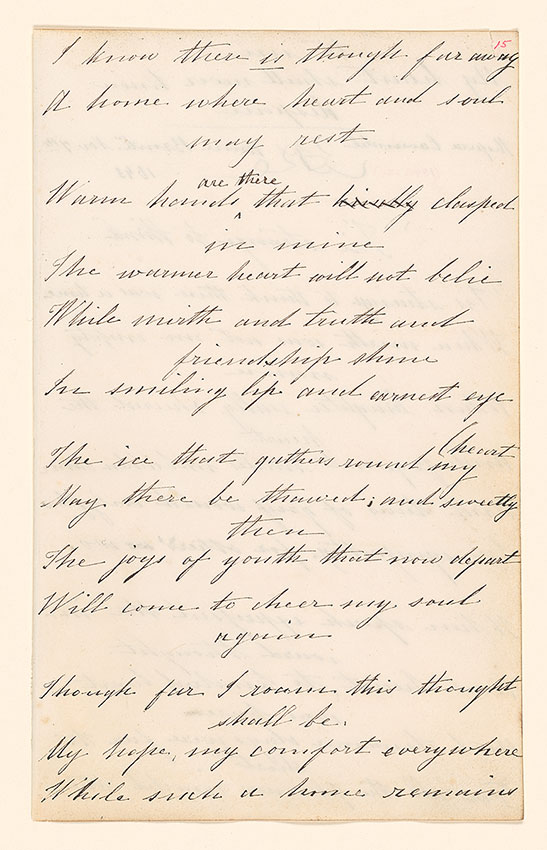
To Cowper and other poems : autograph manuscript of 9 poems, signed, 1842–1845
Purchased by Pierpont Morgan, 1900
“The Consolation” (pp. 13–16)
Dated 7 November 1843, when Brontë was twenty-three. Written in the voice of Hespera Caverndel, a character in the Gondal saga. First published in Poems (1846). Published in Wuthering Heights and Agnes Grey (London: Smith Elder, 1850) with title “Lines Written from Home” and revisions by Charlotte Brontë. Poem 25 in Chitham (1979); also published in The Brontës: Tales of Glass Town, Angria, and Gondal. Selected Writings, ed. Christine Alexander (Oxford University Press, 2010), pp. 466–67.
I know there is though far away
A home where heart and soul may rest
Warm hands are there that kindly clasped in mine
The warmer heart will not belie
While mirth and truth and friendship shine
In smiling lip and earnest eye
The ice that gathers round my heart
May there be thawed; and sweetly then
The joys of youth that now depart
Will come to cheer my soul again
Though far I roam that thought shall be
My hope, my comfort everywhere;
While such a home remains
Text as published in Poems (1846)
I know there is, though far away,
A home where heart and soul may rest.
Warm hands are there, that, clasped in mine,
The warmer heart will not belie;
While mirth, and truth, and friendship shine
In smiling lip and earnest eye.
The ice that gathers round my heart
May there be thawed; and sweetly, then,
The joys of youth, that now depart,
Will come to cheer my soul again.
Though far I roam, that thought shall be
My hope, my comfort, everywhere;
While such a home remains
| Attachment | Size |
|---|---|
| 15.07 MB |
“’Tis strange to think”, p. 16
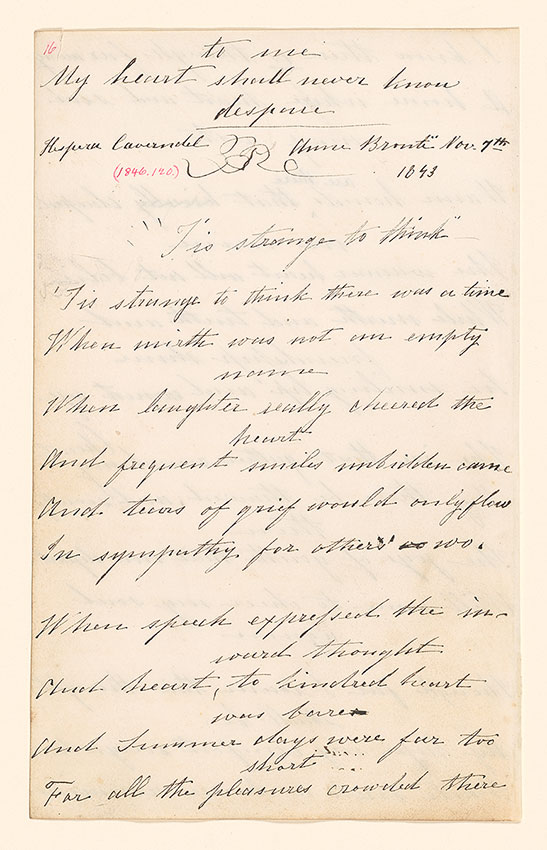
To Cowper and other poems : autograph manuscript of 9 poems, signed, 1842–1845
Purchased by Pierpont Morgan, 1900
“The Consolation” (pp. 13–16)
Dated 7 November 1843, when Brontë was twenty-three. Written in the voice of Hespera Caverndel, a character in the Gondal saga. First published in Poems (1846). Published in Wuthering Heights and Agnes Grey (London: Smith Elder, 1850) with title “Lines Written from Home” and revisions by Charlotte Brontë. Poem 25 in Chitham (1979); also published in The Brontës: Tales of Glass Town, Angria, and Gondal. Selected Writings, ed. Christine Alexander (Oxford University Press, 2010), pp. 466–67.
“’Tis strange to think” (pp. 16–18)
Dated 21 November 1843, when Brontë was twenty-three. First published in Poems (1846) with title “Past Days.” Poem 26 in Chitham (1979).
to me
My heart shall never know despare
——————
Hespera Caverndel Anne Brontë Nov. 7th 1843
T’is Strange to Think
’Tis strange to think there was a time
When mirth was not an empty name
When laughter really cheered the heart
And frequent smiles unbidden came
And tears of grief would only flow
In sympathy for others’ wo.
When speech expressed the inward thought
And heart, to kindred heart was bare
And Summer days were far too short
For all the pleasures crowded there
Text as published in Poems (1846)
To me,
My heart shall never know despair!
PAST DAYS.
’Tis strange to think, there was a time
When mirth was not an empty name,
When laughter really cheered the heart,
And frequent smiles unbidden came,
And tears of grief would only flow
In sympathy for others’ woe;
When speech expressed the inward thought,
And heart to kindred heart was bare,
And Summer days were far too short
For all the pleasures crowded there,
| Attachment | Size |
|---|---|
| 15.07 MB |
“’Tis strange to think”, p. 17
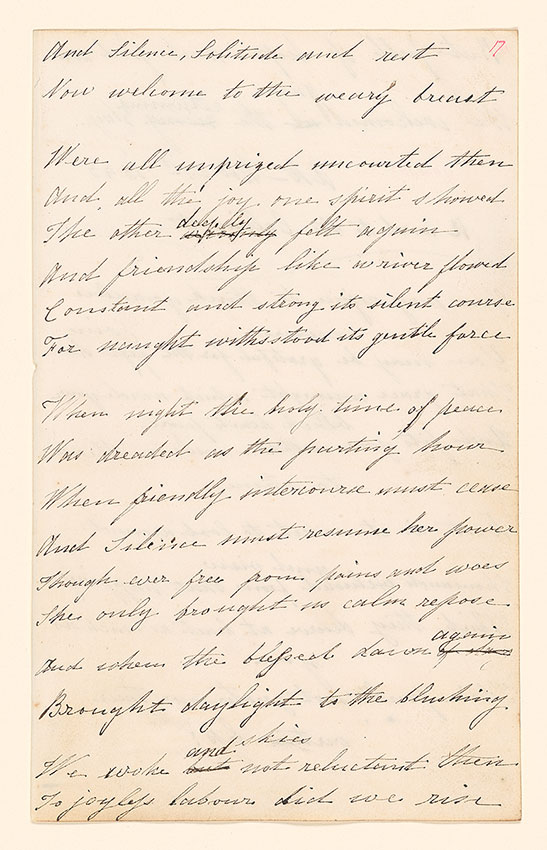
To Cowper and other poems : autograph manuscript of 9 poems, signed, 1842–1845
Purchased by Pierpont Morgan, 1900
“’Tis strange to think” (pp. 16–18)
Dated 21 November 1843, when Brontë was twenty-three. First published in Poems (1846) with title “Past Days.” Poem 26 in Chitham (1979).
And Silence, Solitude and rest
Now welcome to the weary breast
Were all unprized uncourted then
And all the joy one spirit showed
The other warmly deeply felt again
And friendship like a river flowed
Constant and strong its silent course
For nought withstood its gentle force
When night the holy time of peace
Was dreaded as the parting hour
When friendly intercourse must cease
And Silence must resume her power
Though ever free from pains and woes
She only brought us calm repose
And when the blessed dawn of day again
Brought daylight to the blushing skies
We woke but and not reluctant then
To joyless labour did we rise
Text as published in Poems (1846)
And silence, solitude, and rest,
Now welcome to the weary breast—
Were all unprized, uncourted then—
And all the joy one spirit showed,
The other deeply felt again;
And friendship like a river flowed,
Constant and strong its silent course,
For nought withstood its gentle force:
When night, the holy time of peace,
Was dreaded as the parting hour;
When speech and mirth at once must cease,
And Silence must resume her power;
Though ever free from pains and woes,
She only brought us calm repose.
And when the blessed dawn again
Brought daylight to the blushing skies,
We woke, and not reluctant then,
To joyless labour did we rise;
| Attachment | Size |
|---|---|
| 15.07 MB |
“A Word to the Calvinists”, p. 18
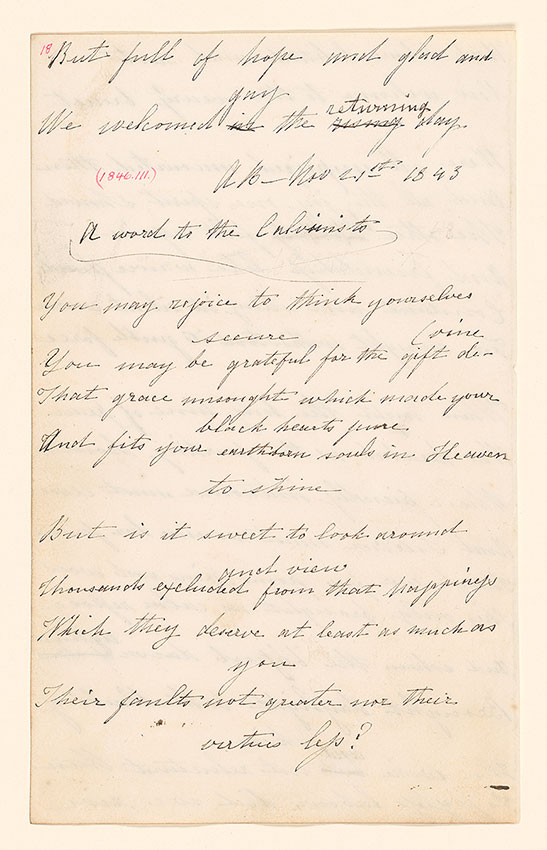
To Cowper and other poems : autograph manuscript of 9 poems, signed, 1842–1845
Purchased by Pierpont Morgan, 1900
“’Tis strange to think” (pp. 16–18)
Dated 21 November 1843, when Brontë was twenty-three. First published in Poems (1846) with title “Past Days.” Poem 26 in Chitham (1979).
“A Word to the Calvinists” (pp. 18–21)
Dated 28 May 1843, when Brontë was twenty-three. First published in Poems (1846) with title “A Word to the ‘Elect.’” Poem 22 in Chitham (1979).
But full of hope and glad and gay
We welcomed in the rising returning day.
AB Nov 21st 1843
A word to the Calvinists
You may rejoice to think yourselves secure
You may be grateful for the gift divine
That grace unsought which made your black hearts pure
And fits your earthborn souls in Heaven to shine
But is it sweet to look around and view
Thousands excluded from that happiness
Which they deserve at least as much as you
Their faults not greater nor their virtues less?
Text as published in Poems (1846)
But full of hope, and glad and gay,
We welcomed the returning day.
A WORD TO THE “ELECT.”
You may rejoice to think yourselves secure;
You may be grateful for the gift divinev
That grace unsought, which made your black hearts pure,
And fits your earth-born souls in Heaven to shine.
But, is it sweet to look around, and view
Thousands excluded from that happiness
Which they deserved, at least, as much as you,—
Their faults not greater, nor their virtues less?
| Attachment | Size |
|---|---|
| 15.07 MB |
“A Word to the Calvinists”, p. 19
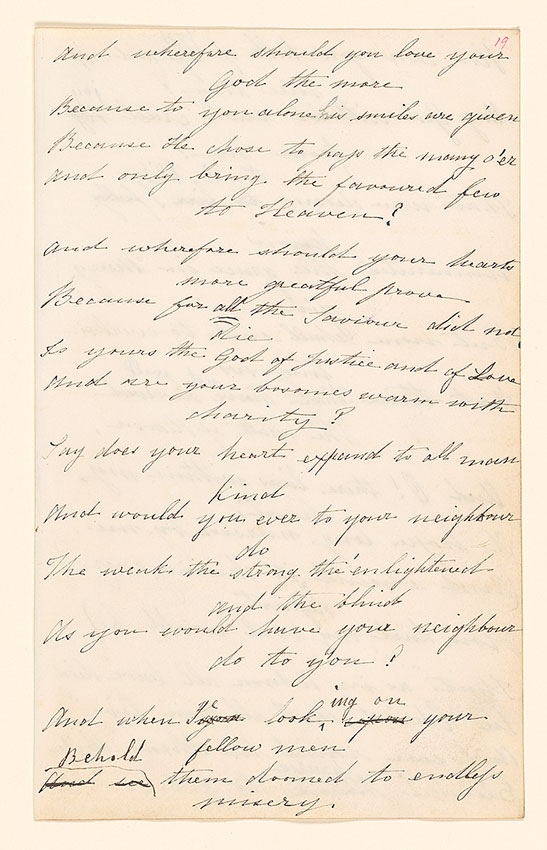
To Cowper and other poems : autograph manuscript of 9 poems, signed, 1842–1845
Purchased by Pierpont Morgan, 1900
“A Word to the Calvinists” (pp. 18–21)
Dated 28 May 1843, when Brontë was twenty-three. First published in Poems (1846) with title “A Word to the ‘Elect.’” Poem 22 in Chitham (1979).
And, wherefore should you love your God the more
Because to you alone his smiles are given
Because he chose to pass the many o’er
And only bring the favoured few to Heaven?
And, wherefore should your hearts more grateful prove
Because for all the Saviour did not die
Is yours the God of Justice and of Love
And are your bosomes warm with charity?
Say does your heart expand to all mankind
And would you ever to your neighbour do
The weak the strong the enlightened, and the blind
As you would have your neighbour do to you?
And when you ye looking upon on your fellow men
And see Behold them doomed to endless misery
Text as published in Poems (1846)
And, wherefore should you love your God the more,
Because to you alone his smiles are given;
Because he chose to pass the many o’er,
And only bring the favoured few to Heaven?
And, wherefore should your hearts more grateful prove,
Because for ALL the Saviour did not die?
Is yours the God of justice and of love?
And are your bosoms warm with charity?
Say, does your heart expand to all mankind?
And, would you ever to your neighbor do–
The weak, the strong, the enlightened, and the blind—
As you would have your neighbour do to you?
And, when you, looking on your fellow-men,
Behold them doomed to endless misery,
| Attachment | Size |
|---|---|
| 15.07 MB |
“A Word to the Calvinists”, p. 20
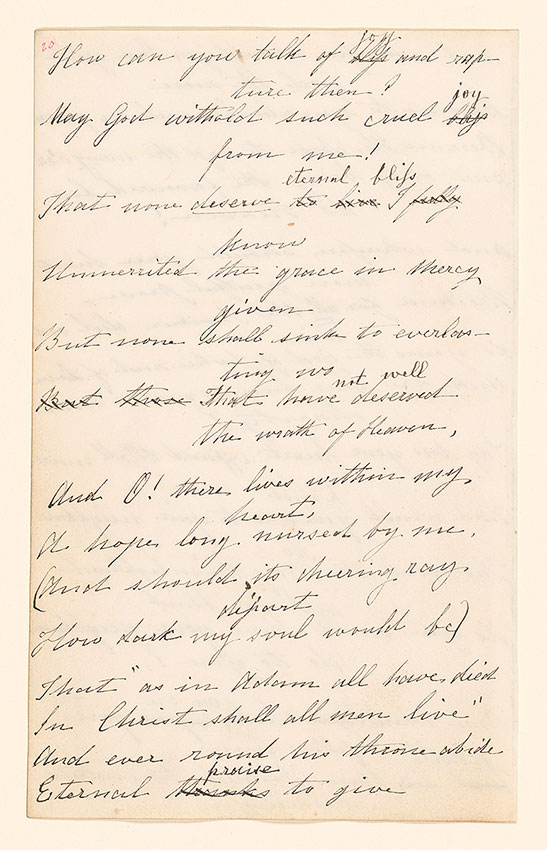
To Cowper and other poems : autograph manuscript of 9 poems, signed, 1842–1845
Purchased by Pierpont Morgan, 1900
“A Word to the Calvinists” (pp. 18–21)
Dated 28 May 1843, when Brontë was twenty-three. First published in Poems (1846) with title “A Word to the ‘Elect.’” Poem 22 in Chitham (1979).
How can you talk of bliss joy and rapture then?
May God withhold such cruel bliss joy from me!
That none deserve to live eternal bliss I fully know
Unmerrited the grace in Mercy given
But, none shall sink to everlasting wo
But those That have not well deserved the wrath of Heaven,
And O! there lives within my heart
A hope, long nursed by me,
(And should its cheering ray depart
How dark my soul would be)
That as in Adam all have died
In Christ shall all men live
And ever round his throne abide
Eternal thanks praise to give
Text as published in Poems (1846)
How can you talk of joy and rapture then?—
May God withhold such cruel joy from me!
That none deserve eternal bliss I know;
Unmerited the grace in mercy given:
But, none shall sink to everlasting woe,
That have not well deserved the wrath of Heaven.
And, oh! There lives within my heart
A hope, long nursed by me;
(And, should its cheering ray depart,
How dark my soul would be!)
That as in Adam all have died,
In Christ shall all men live;
And ever round his throne abide,
Eternal praise to give.
| Attachment | Size |
|---|---|
| 15.07 MB |
“A Word to the Calvinists”, p. 21
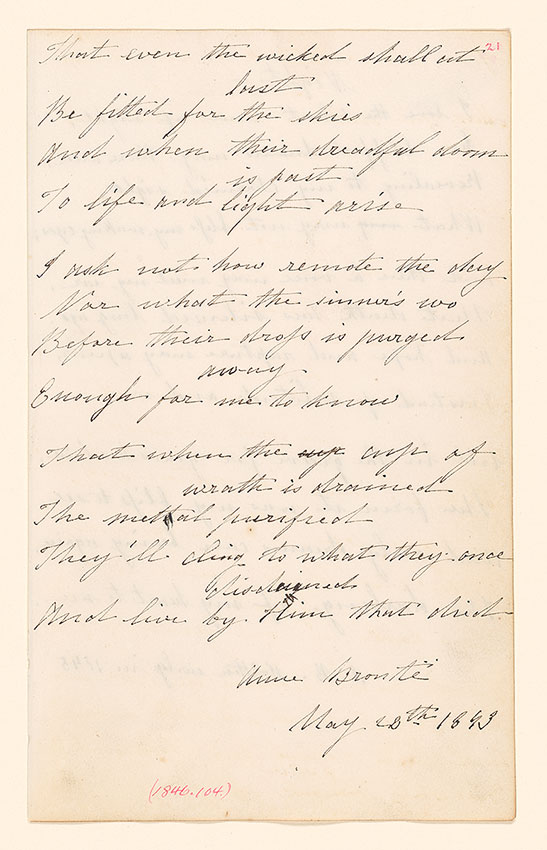
To Cowper and other poems : autograph manuscript of 9 poems, signed, 1842–1845
Purchased by Pierpont Morgan, 1900
“A Word to the Calvinists” (pp. 18–21)
Dated 28 May 1843, when Brontë was twenty-three. First published in Poems (1846) with title “A Word to the ‘Elect.’” Poem 22 in Chitham (1979).
That even the wicked shall at last
Be fitted for the skies
And when their dreadful doom is past
To life and light arise
I ask not how remote the day
Nor what the sinner’s wo
Before their dross is purged away
Enough for me to know
That when the cup cup of wrath is drained
The mettal purified
They’ll cling to what they once disdained
And live by Him that died
Anne Brontë
May 28th 1843
Text as published in Poems (1846)
That even the wicked shall at last
Be fitted for the skies;
And, when their dreadful doom is past,
To life and light arise.
I ask not, how remote the day,
Nor what the sinners’ woe,
Before their dross is purged away;
Enough for me, to know
That when the cup of wrath is drained,
The metal purified,
They’ll cling to what they once disdained,
And live by Him that died.
| Attachment | Size |
|---|---|
| 15.07 MB |
“Night”, p. 22
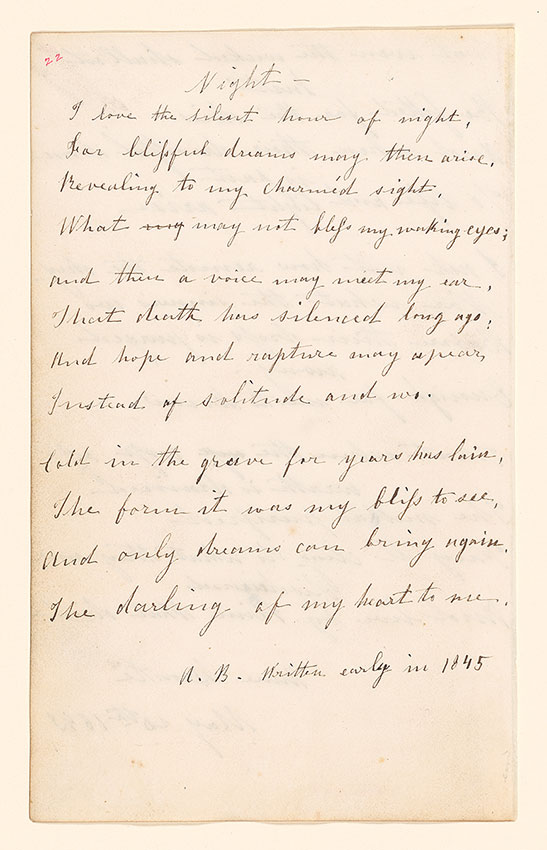
To Cowper and other poems : autograph manuscript of 9 poems, signed, 1842–1845
Purchased by Pierpont Morgan, 1900
“Night” (p. 22)
Dated “early in 1845,” when Brontë was twenty-five or twenty-six. Not included in Poems (1846); first published in Brontë Poems (London: Smith, Elder, 1915). Poem 37 in Chitham (1979).
Night
I love the silent hour of night,
For blissful dreams may then arise,
Revealing to my charmed sight
What my may not bless my waking eyes;
And then a voice may meet my ear,
That death has silenced long ago;
And hope and rapture may appear,
Instead of solitude and wo.
Cold in the grave for years has lain,
The form it was my bliss to see,
And only dreams can bring again,
The darling of my heart to me.
A.B. Written early in 1845
| Attachment | Size |
|---|---|
| 15.07 MB |